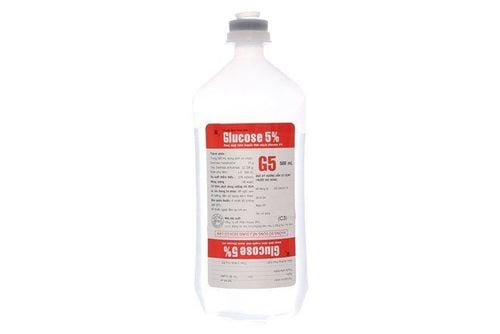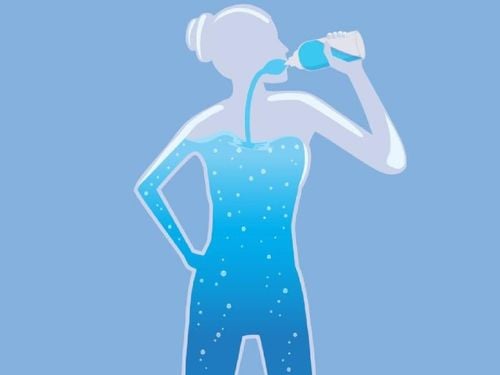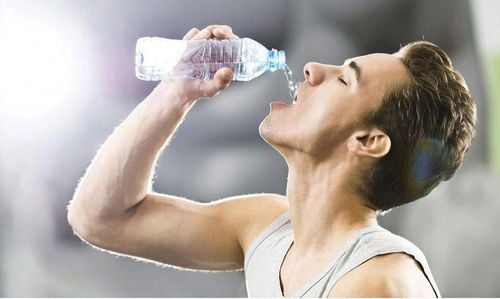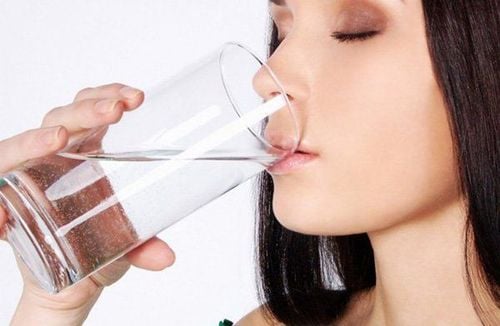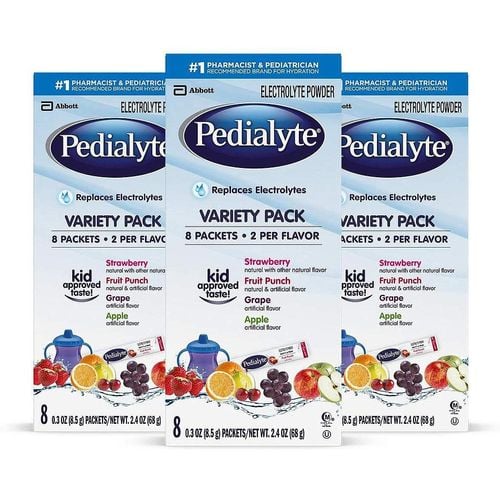This is an automatically translated article.
Our bodies contain a lot of water - 60% of an adult's weight and 80% of body weight, are body fluids. In other words, the body of a 70kg adult contains about 42 liters of water. The water we drink is absorbed by the intestines and circulates throughout the body as a liquid like blood. They perform many different functions that help humans survive. Water first delivers oxygen and nutrients to the cells, while removing waste products, which are then eliminated through the digestive tract. When body temperature rises, blood circulation to the skin increases, facilitating heat dissipation through perspiration, helping to keep the body at a stable temperature. Because your body loses water through breathing, sweating, and digestion, it's important to rehydrate by drinking fluids and eating foods that contain water. The following article will provide useful information to help you understand the role of water for your body.
1. Water and nutrients from water
Water is an essential ingredient in life for each individual, drinking enough water every day plays a very important role in everyone's health. First of all, drinking water helps quench the thirst of the body, prevent dehydration, and bring alertness to continue work. Lack of water causes many consequences such as reduced thinking, erratic mood swings, when the body is too hot, it also causes some diseases such as constipation and kidney stones,...
Water brings many benefits to the body such as: :
Maintain a normal body temperature. Lubricates and cushions joints in the body Protects one's spinal cord and other sensitive tissues Removes waste through glands such as sweat, urination, and bowel movements Rehydrate athletes or In fact, in some cases the body will need more water such as:
For people living in hot climates For people with fever also Drink plenty of water to avoid dehydration. When there is diarrhea, dehydration. Most of each person's fluid needs are met through water supplementation and daily beverages such as foods with high water content such as succulent fruits, vegetables,...
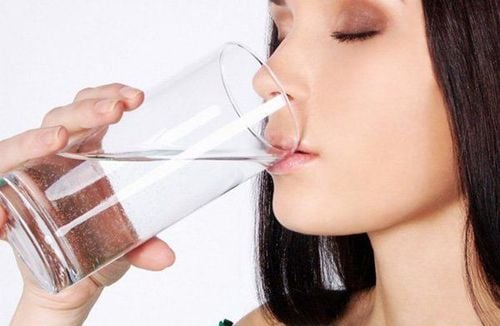
Nước đóng vai trò quan trong cơ thể con người
Here are some ways to help replenish your daily hydration:
Always carry a water bottle with you and fill it up throughout the day Keep water in the freezer and carry it with you so you can use it throughout the day Choose water drink instead of sugary, alcoholic drinks, ... and save money every time you eat out. Adding a little lemon to the water will improve the taste and help add vitamin C to the body. It is advisable to have a choice of healthy, sourced and purified beverages to ensure the health of yourself and those around you. Different types of drinks will have different ingredients and nutritional content such as in filtered water, there will be less vitamin content than in juices. Drinks such as coffee or pure tea, carbonated water and flavored water will contain more calories and sugar than filtered water, long-term use will affect the body such as metabolic disorders, ... Use low-calorie beverages such as low-fat or fat-free milk, fortified varieties such as unflavored soy or almond milk, or 100% pure fruit or vegetable juices containing: They are full of important nutrients like calcium, potassium or vitamin D, so these drinks are recommended by health organizations. For drinks like alcohol, if you can't stop drinking, you should drink in moderation, caffeinated drinks should only be consumed in moderation (up to 400g per day or about 3-4 cups of coffee per day). ). In addition, sugar-sweetened alternatives found in foods or drinks labeled "sugar free" or "diet" may contain high-intensity sweeteners, such as sucralose, aspartame. or saccharin. According to the American Diet, replacing added sugars with high-level sweeteners may reduce calorie intake in the short term, but their effectiveness as a weight management strategy is questioned. Whether it can be long-term or not is still unanswered. In sports, it is very important to use water properly, so use flavored drinks that often contain carbohydrates, minerals, electrolytes, or multivitamins.
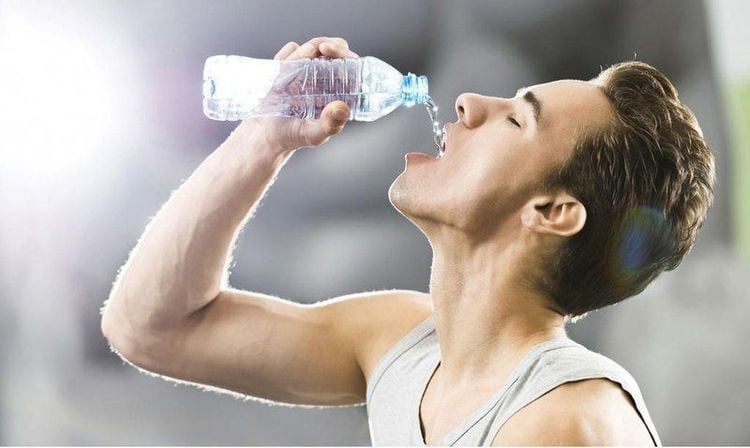
Trong hoạt động thể thao, nước giúp cơ thể tránh khỏi tình trạng mất nước
2. The role of water
Water helps create saliva. Water is the main component of saliva, and saliva also includes small amounts of electrolytes, mucus, and enzymes. It is essential to break down solid food and keep your mouth healthy.
Water regulates body temperature: staying hydrated is very important in maintaining body temperature. Water can escape during sweating, going to the toilet, etc. If not replenished in time, your body will fall into a state of electrolyte and plasma loss when dehydrated.
Water protects your tissues and spinal cord and lubricates your joints, cushioning your joints. This will help you enjoy physical activities and reduce discomfort caused by conditions like arthritis.
Water helps excrete waste through sweat, defecation, and urination. Sweat regulates the body's temperature when you are exercising or the body is heating up, this time it is necessary to add water to reduce the body's temperature down to an acceptable level. Sufficient water also keeps you away from constipation, helps your kidneys work more efficiently, and prevents kidney stones.
Water helps maximize physical performance: Drinking plenty of water during physical activity is essential. Athletes can sweat up to 6 to 10 percent. Therefore, it is necessary to supplement with water containing hydration and avoid affecting your strength, strength and endurance. Also, the negative consequences of exercising in the heat without enough water. can include serious medical conditions, such as low blood pressure and high body temperature, and even extreme dehydration that can cause seizures and death.

Uống nước giúp cơ thể tăng cường quá trình trao đổi chất
Water helps prevent constipation: Eating fiber is not the only way to prevent constipation. It's also important to maintain water intake so that your bowel movements contain enough water
Water aids digestion: Contrary to what some people think, experts claim to drink water first, during and after a meal will help your body break down food more easily. This will help you digest food more efficiently and get the most out of your meal. Research shows that the body adapts to changes in the consistency of food and the contents of the stomach, whether it is more solid or liquid, so food will be digested more quickly.
Water helps absorb nutrients: In addition to helping to break down food, water also helps dissolve vitamins, minerals, and other nutrients from your food. It then delivers these vitamin ingredients to the rest of your body for use.
Water helps with weight loss: Studies have shown a link between body fat and weight loss with water intake in overweight women. Drinking more water while dieting and exercising can help you lose extra pounds.
Water improves blood oxygen circulation: Water carries useful nutrients and oxygen to the whole body. Drinking water daily improves blood circulation and has a positive effect on one's overall health. .
Water helps fight disease: Drinking enough water can help prevent certain medical conditions. These include: constipation, kidney stones, exercise-induced asthma, urinary tract infections, high blood pressure. Water also helps absorb important vitamins, minerals, and nutrients from food, increasing your chances of staying healthy.
Water boosts energy: Drinking water can activate the body's metabolism. An increase in metabolism is associated with a positive effect on energy levels. One study found that drinking 500ml of water increased metabolic rate by 30% in both men and women.
Water helps support cognitive function: Proper hydration is key to maintaining peak cognitive states. Research Trusted Source indicates that not drinking enough water can negatively impact a person's concentration, alertness, and short-term memory.
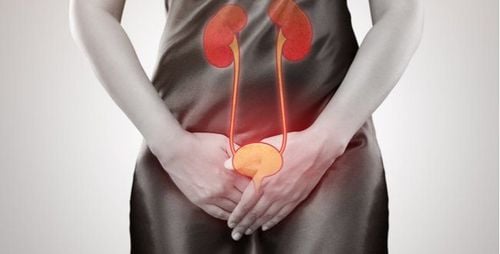
Uống đủ nước giúp ngăn ngừa các bệnh về đường tiết niệu
Water improves mood: Not drinking enough water can also affect your mood. Dehydration can lead to fatigue and confusion as well as anxiety, affecting the emotions and moods of you and those around you.
Water helps keep skin bright: Drinking enough water will help keep skin hydrated and can promote collagen production. However, drinking water alone is not enough to reduce the effects of aging. This process is also related to genes and overall sun protection.
Water prevents overall dehydration: Dehydration is the result of not having enough water in the body. And because water is essential for so many bodily functions, dehydration can be very dangerous. Severe dehydration can lead to a number of serious complications, including: swelling in the brain, kidney failure, seizures jerk.
Please dial HOTLINE for more information or register for an appointment HERE. Download MyVinmec app to make appointments faster and to manage your bookings easily.
References: cdc.gov, healthline.com




